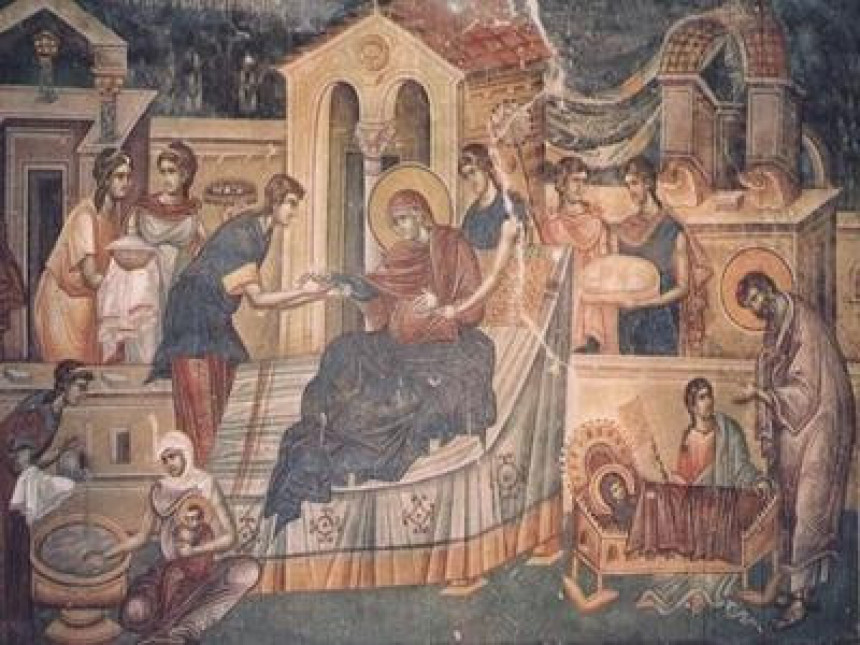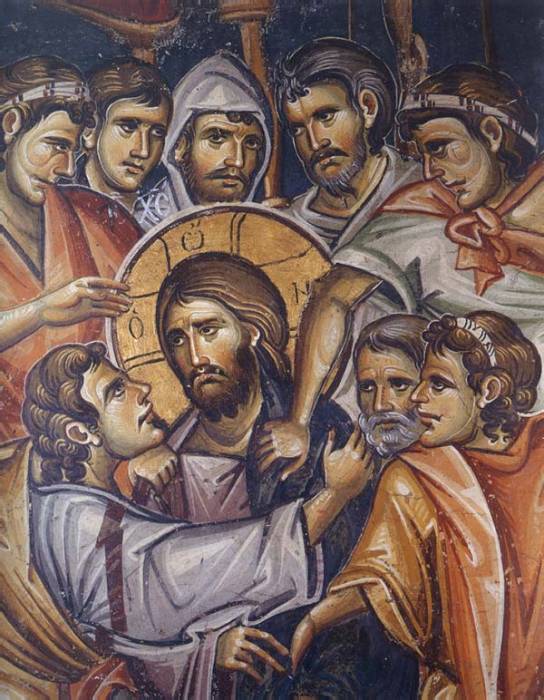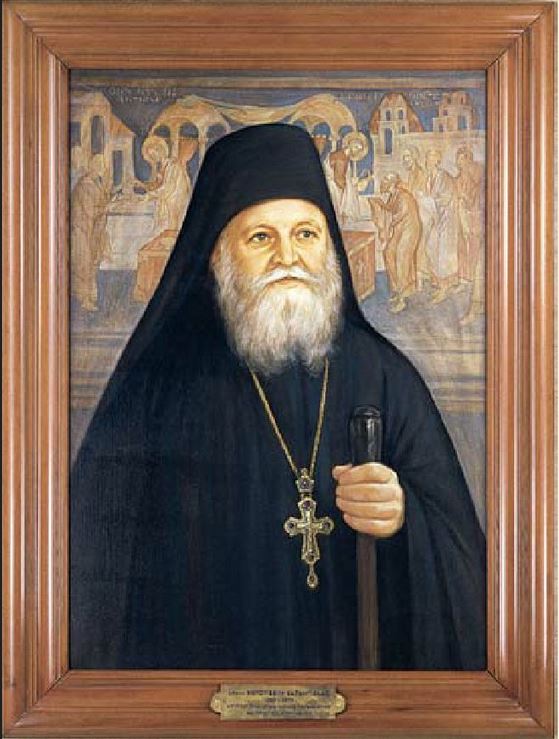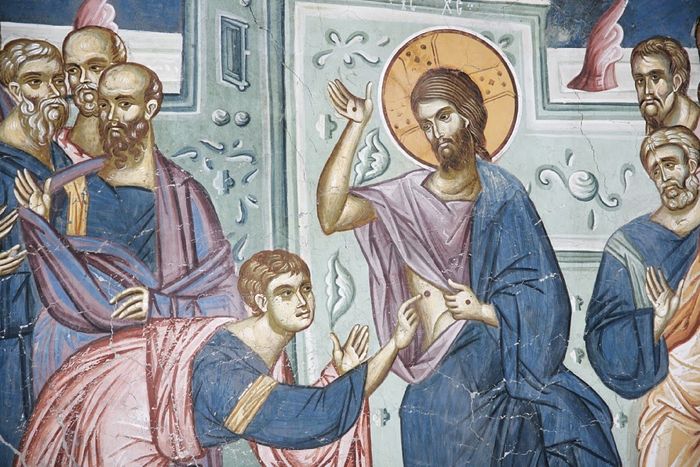In the early hours of Saturday, December 7, 2024, a great Struggler for our Orthodoxy, Elder Meletios Kapsaliotis, in the world Zacharias Kyralakis, passed away.
Continue readingCategory Archives: Uncategorized
Greetings with the Feast of the Nativity of Our Most Holy Theotokos
St. Kosmas of Aitolos: The story of Judas
There was a town named Iskaria near Jerusalem. A Jew lived there with his wife. She saw in a dream that she would give birth to a devil who would burn the entire world. She revealed what she had seen to her husband… Finally she gave birth to Judas. They kept him for two months, and then put him in a trunk and threw him into the sea and said: “If God wills, let him be saved; if not, let him be lost.”
Near the harbor there were some passersby who, seeing the chest in the deep, went and pulled it out. They opened it and found the child and took him to their town, Iskaria. But they didn’t tell anyone they found him in the sea, but that he was an orphan. His [real] parents said: “Why, don’t we take him and make him our own?” So they took him and he grew up. In the same year his mother gave birth to another child. When the children became twelve years of age, they quarreled and Judas beat the true son. The parents said to Judas: “Why did you beat our child? We have adopted you. We, my child, plan to make you both our heirs, to divide everything equally.” Hearing that he would receive an equal share with the other boy, what do you think Judas was moved by the devil to do because of his avarice? One day he took a stone and killed his brother. What did the father do? Kill him? No. He felt sorry for him. When Judas killed the boy, he became frightened and left and went to Jerusalem, where he took service with a king who gave him charge of the treasury, that is, to receive and pay monies. Why did he take service with the king? Because of his avarice he believed he had much to gain.
Continue readingTrue Theology
We’ve said how, here in Greece, not only do we not read but we don’t even know of the existence of the mystical Fathers who enlightened Orthodoxy. For the theologians, Orthodoxy has become a hollow word, since its mystical essence is unknown to them, as is its tradition. Our theologians receive the light from the West, because their theology has become a science, and their vainglory is flattered by this thing. Faith, for them, has no significance. You’ll tell me, “Theology without faith? Can you do that?” I ask you, too, equally puzzled, “Can you have theology without faith?” Nevertheless, in the Western lands and in America, many people have turned towards Orthodoxy, out of thirst for the truth. In Greece, only a few people and some Old Calendarists read the books of the Fathers, besides Basil and Chrysostom, whom the theologians take for orators and philologists of the Ancient Greek language. The books of the mystical Fathers are no longer reprinted and have become rare. The official Church prints some rough drafts of various modernist theologians, without any essence, which only reveal the incredible nakedness of their authors. Only just recently have the Apostolic Ministry Publications started to print Migne’s Patrology.
Continue readingArchimandrite Cherubim Karambelas (1926-1979)
In the beginning of August 1938, the steamer “Samos”, carrying out the dull itinerary of Piraeus-Alexandroupolis-Kavala-Thessaloniki, reaches Daphne, the small port of Mount Athos. Among the few passengers to disembark is eighteen-year old George Karambelas from the village Constantines of Messinia.
The only son of the suffered widow Dimitra (†1973), who had lost her husband Michael (†1921) in the Asia Minor front of Greece’s war on Turkey only two years after her marriage, left his mother and his home in Piraeus behind to live as a monk in the Garden of Virgin Mary, “between heaven and earth”.
Following a brief pilgrimage in the blessed Athonite land, he decided to join a Kalyva (dwelling) in St. Anne’s Skete, that of the Nativity of the Mother of God. There leading the ascetic life were the austere elder Gregory, former army officer, hieromonk Joachim along with monks Stephen, Paisius and Gregory.
Continue readingPatriarch Pavle of Serbia – Interview 1996
Orthodox Elders on How We Can Learn to Pray
In order to learn to pray we should start to pray!
Metropolitan Athanasios of Limassol, the Church of Cyprus:
There is a Greek proverb: “Appetite comes with eating.” In order to learn to pray we first must force ourselves to pray. The Lord in the Gospel says, The kingdom of heaven suffereth violence, and the violent take it by force (Mt. 11:12).
In order to learn to pray we should start to pray! Through our efforts prayer will be in action inside us. And in each one of us it will work in a unique way because we are all unique, and prayer is the expression of every individual soul in its communion with God.
What helps us pray? The fulfilment of the commandments. Once we have broken any commandment, we “stumble” in prayer. The Church sacraments, especially confession and Communion, were given us to help us improve. Staying in the spirit of obedience, concentration and silence also has a salutary effect on our prayer…
And then prayer begins to work in us. Elder Ephraim of Katounakia used to say: “My prayer directs me, and not vice versa.” And prayer will guide us where the Lord wants us to go.
You just need to start praying
Schema-Archimandrite Iliy (Nozdrin):
The prayer of every human being is of cosmic importance—that is, it has an effect not only on somebody individually, or his family and immediate circle of friends, but also on the entire world. Likewise, every sin brings the universe closer to its destruction.
If we take care of our bodies, nourishing, clothing and protecting them, then how can we fail to take care of our souls? The life of the soul is sustained by prayer.
You just need to start praying. When a baby is born, he receives all-round care from its parents. Likewise, when a person is born into spiritual life, God helps him in everything in the initial stage.
Continue readingOur heads are down in screens
Homily on Thomas Sunday
After the forty days of Great Lent we enter into a new forty-day period, but of an absolutely different nature. Then we mourned over our sins and confessed our weaknesses, humbling ourselves with fasting and abstinence. In everything we were as ones guilty, begging for mercy and the remission of sins.
The new forty-day period, beginning with the radiant Resurrection of Jesus Christ, has put us in this new bright state of a Christian freed from condemnation, resurrected for the new holy life, and confident in the everlasting blessedness granted to him in eternity.
There we saw a model for us in our Lord: How, entering into the work of saving the human race, He spent forty days in the strictest fasting, in solitary prayer, and in the struggle against the invisible enemy.
Here we see the same Lord appearing to His disciples for forty days, but we see Him glorified, victorious, and triumphant over all enemies. These repeated appearances of the Lord to His disciples after His Resurrection are so comforting to us. All of them testify to the Lord’s very great love for those who believe in Him.
Continue readingService schedule
Dear parishioners,
Below is the schedule of Services in our Church for the period from April 24 to May 2.
1. Saturday, April 24. (Lazarus’ Saturday) Holy Liturgy at 10:00 a.m.
2. Sunday, April 25, (Palm Sunday) Holy Liturgy at 10:00 a.m.
3. Wednesday, April 28. Akathist to St. John of Shanghai at 6:00 p.m.
4. Thursday, April 29. (Great Thursday) Holy Liturgy at 10:00 a.m.
5. Thursday, April 29. (Great Thursday) Service with the reading of the 12 Gospels at 6:00 p.m.
5. Friday, April 30. (Good Friday) Evening Service at 6:00 pm (online registration required).
6. Friday, April 30 (Good Friday) Evening Service at 7:30 pm (online registration required).
7. Saturday, May 1. (Great Saturday) Holy Liturgy at 10:00 am.
8. Sunday, May 2 (Easter) Holy Liturgy at 9:00 a.m. (online registration required).
After the Holy Liturgy there will be the consecration of Easter eggs at 11:00, 11:30, 12:00, 12:30 and as long as there is a need. A separate message will be sent with registration instructions for Good Friday and Easter. Registration is not required for other days because we do not expect more than 70 parishioners, which is the maximum number of attendees allowed.







